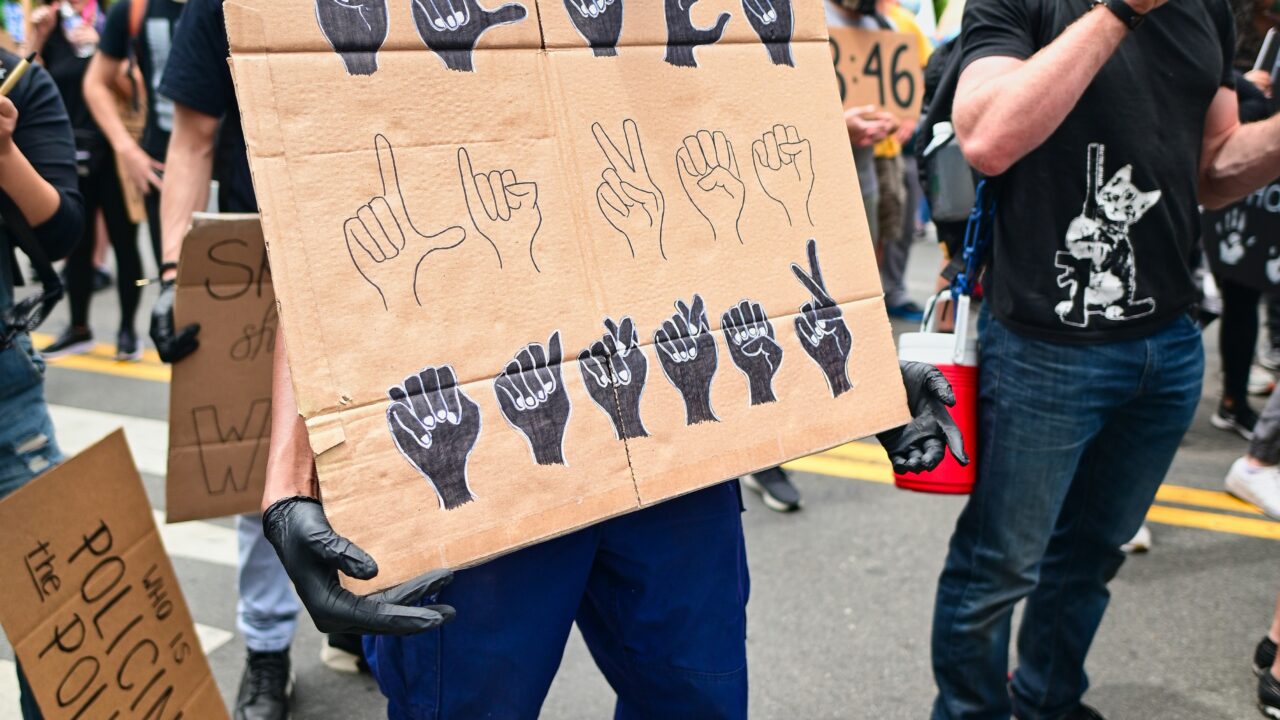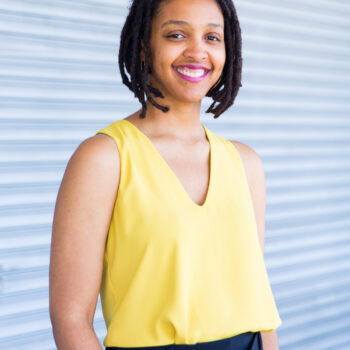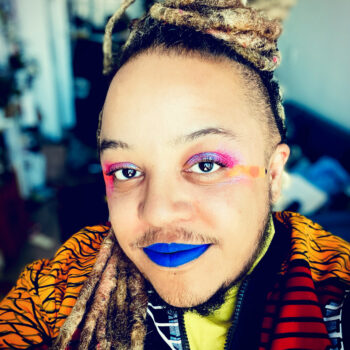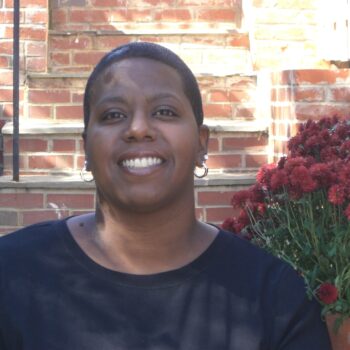Liberation in a Generation co-executive director Solana Rice sat down with Syrus Marcus Ware and Dara Baldwin to talk about the relationship between disability justice and the movement to abolish prisons and police. Ware is an artist, researcher, youth advocate, and educator as well as a core team member of Black Lives Matter Toronto. He’s currently working on a PhD at York University, where he’s looking at the experiences of Black disabled artists. Baldwin is the director of National Policy for the Center for Disability Rights.
Ware and Baldwin shared their thoughts on the long struggle for abolition, the centrality of disability justice to the movement, and their vision for building safe communities. The interview has been edited and condensed.
Solana Rice: I would love to hear about the past year from your perspective.
Syrus Marcus Ware: What a year, what a year. So as an activist and an organizer on the front lines, this year has been an incredible one. I’ve been an abolitionist for 25 years. I mean, that’s 25 years of trying to start a conversation with anybody who would listen about the possibility of abolition and having every single conversation shut down with, “But what about the really bad people?” People just could not engage with this conversation. And then suddenly in May of 2020, everybody’s an abolitionist. And everybody is talking about abolition. I’m reading about it in Cosmopolitan magazine. It seems like it was on everybody’s lips. Now we’re in a moment where people are dreaming and they’re imagining and they’re building and they’re creating and they’re already living as if we were there. They’re living abolitionist lives right now.
This is a revolutionary moment. Revolution is not a one-time event. It’s an ongoing process. In the middle of this revolutionary moment, we get to plant new seeds of what we want to see growing in the place of the old. Our ancestors were also planting seeds of abolition. Part of the work that we’re doing right now is finally abolishing slavery through the abolition of police and prisons. I think we’re going to have abolition in our lifetime. I think this is the year that we’re going to remember that everything changed.
Dara Baldwin: [This year] has been catastrophic and illuminating, right? It has been interesting to see white folks actually stop and listen, specifically around policy. It is white people who rule these tables here in DC. Even the Black groups, white folks sit on their boards, white folks fund them. And it is a white-centered conversation around the work they do. And it’s been interesting to watch us telling them: move out the way and let us lead. You all are no longer in charge. Specifically, in disability community, having #BlackDisabledLivesMatter coming out of this work is amazing to me.
SMW: Black Lives Matter Toronto has always positioned itself as a disability justice group. It was a group that was specifically calling out the waves of Black mad people in particular who were being killed here in Toronto. Black Lives Matter is well positioned to say [abolitionist] demands are necessarily rooted in disability justice. It’s never Black disabled people who we’re imagining at the front of the revolution. Well, honey, this time it is; that is what is happening. We have this visible queer and trans disabled Black leadership in this movement for Black lives right now. And it is making the conversation intersectional. And I am so here for it.
SR: What’s your vision of safety, and how do we know that the seeds that we’re sowing and watering are leading to that vision?
DB: The possibilities are endless. The solutions come from the communities, and each community is gonna have their own changes. But I will say fundamentally in those changes is the investment in Black people and in Black lives and in the ways in which people’s lives are changed through education, through transportation, through housing, through employment, through environmental care. Those are the basics. Everybody talks about that, but what does that look like? And you’re right. Are we watering the right seeds is a very good way to look at it. I think many of us have planted the correct seeds, and I think we’re watering the correct things. There are some who are gaining water who should not get water. And we need to start saying that. When people are doing wrong by us, we have to start saying, sorry, you’re not doing this right.
People always go to punitive actions, that if you cause someone harm, they will do better. If you’re speeding, they put up speed cameras and say, oh, if we give them tickets, they’ll stop speeding. That’s a white-centered thought. That is what structural racism is about. That is back to the founding of this country. That is what the slave master did to the slaves. Beat these slaves, and they will act right. It stays within white folks, and how they come up with solutions to problems is that, if we harm them, they’ll do better. It didn’t work on the war on drugs. It didn’t work on the war on poverty. Every time they got to do something with war, war, war, and who gets harmed? Black and brown folks.
One community in San Francisco where they had a lot of speeding, they decided to have classes and conversations with the neighborhood and say, you need to stop speeding through here because this is where the kids go back and forth to school, and where elderly people go to the senior citizens place and have fun. There’s a park here. They used the unhoused and said, “Hey, if you come here every morning and get a yellow vest and hold this sign up that says slow down, we’ll give you $50 a day.” They did that in the neighborhood, and it’s slowed the speeding down.
So there are many different ways in which to find solutions. And I leave that to communities to do. But what I will say is that when you come towards your solutions, we must start using love and care and not being punitive and harmful. That does not create community nor does it create solutions that are long term, where people can not only live but thrive.
SMW: There are so many options. We know that police do not keep our community safer or more secure. We know that prisons do not keep our community safer or more secure. The origin of the police force was the slave patrols that were designed to catch Black people and bring us to slave labor camps. The origin of the RCMP here in Canada and Northern Turtle Island was to grab and to catch Indigenous people and to disappear them from the land as a way of fueling settler expansion. We know that that is the origin and that is what continues today. So they’re not on the streets to protect us or to keep us safe. That’s not what’s happening. Instead, there’s this targeted policing that’s resulting in extreme brutality that particular parts of our community are facing at a disproportionate rate. And in particular, Black mad people are being killed at a disproportionate rate over and over again.
So, what replaces policing? We have so many options and so many possibilities. We can create housing programs so that everybody has housing. We can make sure that everybody has access to food. We can make sure that there’s a safe supply of drugs that are not contaminated. We can decriminalize sex work. We can address conflict, crisis, and harm in new ways. We can create mad-led community supports. We can teach our children about conflict resolution without relying on the state. There are all of these strategies that we could do in order to start to build networks of care within our community And that would root safety in our hands.
We have this fallacy [where we think that the police] are doing all of this work, and they’re not. When they respond to wellness checks, they kill us regularly. When they respond to mad people in public space, they shoot first and then respond. They are perpetrators of sexual violence [and] they also respond terribly in cases of sexual violence in ways that retraumatize the folks who have experienced the violence. When there’s a conflict and they arrive, things escalate. So they’re not doing what we think they’re doing.
Dr. Viviane Saleh-Hanna breaks down this myth of the dangerous few that we supposedly need prisons for. She says that one of the problems with our current system is that we’re expected to provide an elaborate roadmap of what we’re going to do instead of police and prisons, in order to get out of this violence system that we find ourselves in. She relates the prison and policing system to an abusive relationship. And she says, it’s in this abusive relationship that we’re trying to leave that we’re being told, prove to me that you can do this without me, prove to me how you’re going to solve your problems without me. She’s saying, fuck that. She’s saying, we get to leave even if we don’t have it all figured out yet. So even if we don’t know exactly the roadmap of what abolition is going to look like, we can still do better than our current system. So let us try it. Now is the time to start to live it.
SR: What is something that is being said but remains unheard?
DB: I think Syrus said it beautifully: well, what are the solutions? You guys don’t know what you’re talking about. We’re not being heard that we do know what we’re talking about and that we do have solutions. You’re hearing what you want to hear. We believe in the realm of possibilities.
And then we keep saying Black disabled people are leaders and powerful people, but it’s not being heard. It’s not being heard, not only in the disability rights community but it’s not being heard in civil rights communities and LGBTQ civil rights communities. And I’m tired of that. I’m tired of those voices being ignored. But at the same time, I’m loving the fact that they don’t care. That they just keep on doing what they need to do and just roar all over these other people
SMW: I think what you’re saying is exactly it. I think that there are still folks that don’t get that disability justice is not the revolution if disabled people aren’t involved. And for the folks who talk about organizing or talk about movement building but [are] not talking about disability justice, I got to tell you, you ain’t getting it right. You ain’t getting it right. And that’s not the future that we’re headed towards. The future that we’re headed towards is going to be radically different. We are going to dismantle white supremacy and therefore necessarily dismantle liberalism. That is the future that we are headed towards; we will stop at nothing less than that. Our children deserve that, our great-grandchildren deserve that, our ancestors deserve that, to finally be able to rest because their work will be complete. We’re coming for you so please, please, please recognize and realize that you need to be centering [disability justice] in your work in order for it to be better, in order for it to be fuller, in order for it to do the work that we’re actually trying to do to build this world that is going to allow for us all to thrive. We’re going to be so much freer.



